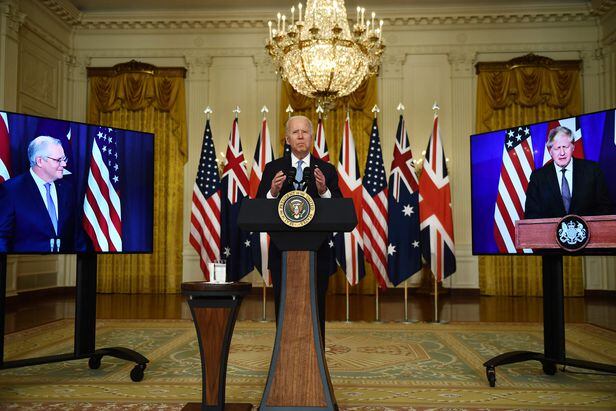
A Powerful Country Pulls No Punches with Smaller Countries
(South Korea) on 24 September 2021
by Kang In-seon (link to original)
For the superpowers, international politics is like moving horses on a huge chess board. Small countries are not considered part of the big picture. This was evident when the United States withdrew from Afghanistan, leaving the Afghan people facing death under the Taliban. France, which is the United States’ bitter but important ally, was no exception to this practice.
After the Biden administration recently established the AUKUS trilateral security cooperation partnership with the U.K. and Australia, the U.S. and the U.K. announced that they will work together to establish Australia’s nuclear-powered submarine fleet. No one mentioned China, but it was obvious that AUKUS is a new security network designed to keep China in check in the Indo-Pacific.
The United States has not transferred nuclear propulsion technology to any other country since doing so to build nuclear-powered submarines in the U.K. in 1958. South Korea wanted such technology, but the U.S. rejected the unprecedented request. However, when President Joe Biden said he would rush the technology to Australia, the international community was shocked, and France was completely outraged as its $66 billion contract with Australia to build submarines was canceled. France felt betrayed, saying they had not received any word in advance about the arrangement. On the other hand, Australia is receiving full support from the United States by participating in almost all anti-China efforts, including the Quadrilateral Security Dialogue. This is the result of geopolitics and will.
In retrospect, diplomacy in the era of former President Donald Trump was simple. Almost all countries were concerned about dealing with Trump’s unpredictability rather than thinking about relations with the United States. In the meantime, the United States failed to properly deal with the challenges it had to face with its allies, such as the rapid rise of China.
For this reason, Biden-era diplomacy has become more complex and urgent. During his U.N. General Assembly speech held a few days ago, Biden promised to pursue relentless diplomacy. Although he didn’t specifically name China, his language was directed toward China. “The United States will compete vigorously and lead with our values and our strength,” Biden said. The U.S. has been working toward achieving such relentless diplomacy by building security to keep China in check.
In the Indo-Pacific region, Japan, India and Australia joined together to launch the Quad, which was followed by AUKUS. Five Eyes, the intelligence alliance of the United States, Canada, Australia and New Zealand, is trying to expand by adding South Korea and other countries.
The House Armed Services Committee deleted an existing provision from an amendment to the Defense Authorization Act that prevented the reduction of U.S. forces in South Korea. As a result, it has loosened the safeguards that Trump imposed to prevent the reduction of U.S. troops in South Korea. As a result, it opens the door for Biden to freely deploy U.S. forces in Asia and will prompt a response from China. South Korea is already caught in this whirling vortex whether it wants to be or not, and this changed situation demands a new level of strategy and tactics from South Korea.
Present Moon Jae-in reiterated the end of war declaration in his last speech before the U.N. General Assembly. He offered no other argument based o history. Moon could not have been unaware of the warning from the International Atomic Energy Agency that “In the Democratic People’s Republic of Korea, the nuclear program goes full steam ahead.” He knows better than anyone about how relentlessly North Korea has increased its nuclear and missile capabilities, and how fiercely the United States and China are competing. It was disappointing to see the president repeating the logic of the end of war declaration without considering the reality of the situation. Hearing Moon’s speech, the international community will have sensed the limitation of not keeping pace with the changing world rather than any strong desire to declare an end to the war.
